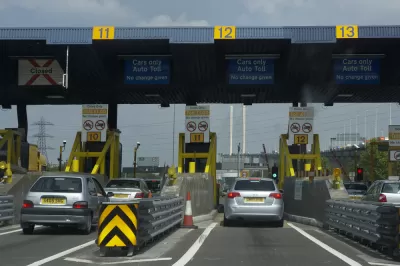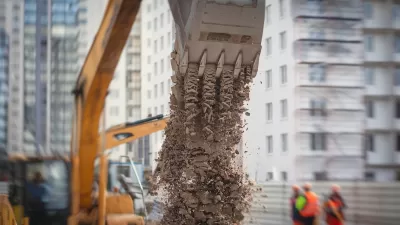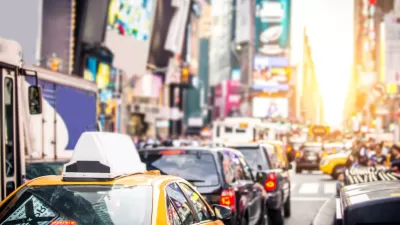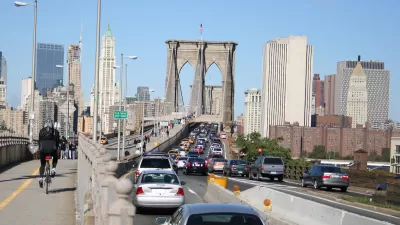A timely debate, as New York City debates a congestion pricing scheme proposed by Gov. Andrew Cuomo, and California looks for ways to reduce emissions from transportation.

Michael Manville tackles the big, politically challenging problem of congestion pricing. Of particular concern is the typical congestion pricing opposition argument of its impact on populations living in poverty.
Before debating the question of whether tolls are fair, Manville explains congestion pricing and also cites examples of the success of congestion pricing schemes in London, Stockholm, Milan, and Singapore. If you're looking for a clear, concise explanation of the concepts behind congestion pricing, the beginning of Manville's article is a good place to start.
Then, Manville turns to the polemic, and the question of congestion pricing's fairness to people dealing with poverty.
…Tolls would be regressive — their burden is larger for lower-income people. On the other hand, not all low-income people drive. The poorest people generally can’t afford cars, so tolls would not hurt the most vulnerable — and might even help them (if reduced traffic congestion let buses travel faster).
That said, many low-income people do drive, and tolls may burden them. Fortunately, tolls also come with a built-in solution to this problem: revenue. Toll revenue can offset costs for low-income drivers…
More compelling arguments to refute the idea that congestion pricing can't be fair, and also that the status quo is fair at all, conclude the article. For the real world situations where large population centers are considering measures to mitigate congestion and its negative environmental and economic outcomes, see the debate over Governor Andrew Cuomo's congestion pricing proposal for New York City, and a discussion of California's elephant in the room of climate change: emissions from cars.
FULL STORY: Is congestion pricing fair to the poor?

Alabama: Trump Terminates Settlements for Black Communities Harmed By Raw Sewage
Trump deemed the landmark civil rights agreement “illegal DEI and environmental justice policy.”

Study: Maui’s Plan to Convert Vacation Rentals to Long-Term Housing Could Cause Nearly $1 Billion Economic Loss
The plan would reduce visitor accommodation by 25% resulting in 1,900 jobs lost.

Planetizen Federal Action Tracker
A weekly monitor of how Trump’s orders and actions are impacting planners and planning in America.

Wind Energy on the Rise Despite Federal Policy Reversal
The Trump administration is revoking federal support for renewable energy, but demand for new projects continues unabated.

Passengers Flock to Caltrain After Electrification
The new electric trains are running faster and more reliably, leading to strong ridership growth on the Bay Area rail system.

Texas Churches Rally Behind ‘Yes in God’s Back Yard’ Legislation
Religious leaders want the state to reduce zoning regulations to streamline leasing church-owned land to housing developers.
Urban Design for Planners 1: Software Tools
This six-course series explores essential urban design concepts using open source software and equips planners with the tools they need to participate fully in the urban design process.
Planning for Universal Design
Learn the tools for implementing Universal Design in planning regulations.
Caltrans
Smith Gee Studio
Institute for Housing and Urban Development Studies (IHS)
City of Grandview
Harvard GSD Executive Education
Toledo-Lucas County Plan Commissions
Salt Lake City
NYU Wagner Graduate School of Public Service





























